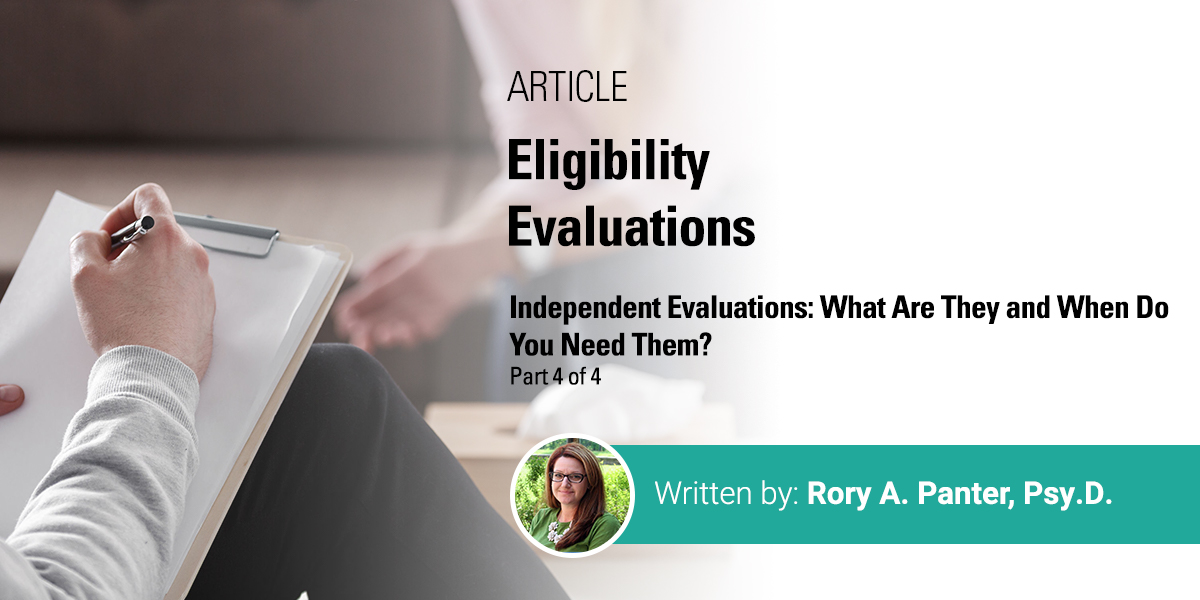Independent Evaluations: What Are They and When Do You Need Them? 4 of 4
Written by Dr. Rory Panter, Licensed Psychologist
If you are an adult with a developmental disability or the parent of an adult child with a disability, there are services that you may be eligible for, which may require an evaluation by a licensed psychologist. The Division of Developmental Disabilities (DDD) provides public funding for services and supports that assist New Jersey adults with intellectual and developmental disabilities, age 21 and older, to live as independently as possible. In order to receive DDD services an individual must submit an application and be deemed eligible based on meeting the functional criteria of having a developmental disability designated by DDD. The specific criteria are that the individual has a chronic physical and/or intellectual disability that: manifests in the developmental years (before age 22); is lifelong in nature; and substantially limits the individual in at least three of the seven areas of life activity (self-care, learning, mobility, communication, self-direction, economic self-sufficiency, and the ability to live independently). During the application process, a current Psychological Evaluation may be necessary to determine if an individual meets the designated criteria. It is necessary to gather data about the individual’s cognitive, emotional, adaptive behavior, social, and behavioral functioning (both current and past). These evaluations typically have an “in-office component,” during which the individual completes a battery of assessment measures. This direct testing is given in a one-to-one format by a licensed psychologist. The evaluation may consist of least several of the following: clinical interview with parent/caregiver and adult client; social-emotional and developmental history; adaptive behavior rating scales; intelligence (IQ) testing; academic achievement testing; and a review of records. Based on the results of the evaluation, the psychologist provides a comprehensive report of the findings, including a professional opinion as to whether the individual should be found eligible to receive DDD services.
Social Security Disability Income (SSDI) is a federal government program designed to protect workers against the loss of ability to earn an income due to complete disability. An individual must apply for disability benefits through the Social Security Administration. Applying for, and being granted, these benefits is a lengthy process and many initial claims are denied and result in a rejection-appeal process. Social Security pays benefits to people who become disabled before retirement age and are unable to work due to a medical condition that’s expected to last at least one year or result in death, including physical and psychological conditions. Determination criteria include that the condition must interfere with the individual’s ability to independently acquire and retain substantive gainful activity. While the determination for eligibility is made by the state’s Disability Determination Services, having the individual participate in an Independent Psychological Evaluation may provide evidence to support the need for such support. The goal of this type of Psychological Evaluation is to document the individual’s symptoms and current psychological, educational, social-emotional, and adaptive functioning, provide an account of how their symptoms are interfering with daily functioning, and assist in determining the extent to which their current functioning interferes with the ability to obtain and sustain substantial gainful employment.
Similar to the evaluation for DDD eligibility, these evaluations typically have an “in-office component,” during which the individual completes a battery of assessment measures, in a one-on-one format by a licensed psychologist. The evaluation may consist of at least several of the following: clinical interview with parent/caregiver and adult client; social-emotional and developmental history; adaptive behavior rating scales; intelligence (IQ) testing; academic achievement testing; and a review of records. Based on the results of the evaluation, the psychologist provides a comprehensive report of the findings, including a professional opinion as to whether the individual should be considered for Supplemental Security Income.






